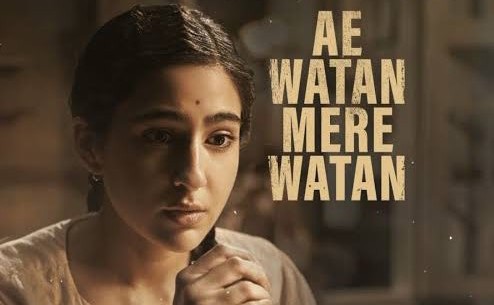Available for streaming on Amazon Prime Video, “Ae Watan Mere Watan” features Sara Ali Khan portraying a khadi-clad freedom fighter challenging British rule.

In the realm of Mumbai cinema, where history and politics often serve as vehicles for blatant propaganda, approaching a film like “Ae Watan Mere Watan” can be met with trepidation. Produced by Dharmatic Entertainment and Amazon MGM Studios, this historical thriller thankfully avoids agenda-driven storytelling.
Also Read:- Love in Bloom: Pulkit Samrat and Kriti Kharbanda Tie the Knot in Intimate Ceremony; See Photos
Ae Watan Mere Watan Review
Available for streaming on Amazon Prime Video, “Ae Watan Mere Watan” features Sara Ali Khan portraying a khadi-clad freedom fighter challenging British rule. Rather than succumbing to excessive dramatization, the film presents a lesser-known yet significant chapter of India’s independence movement with restraint.
Directed by Kannan Iyer, known for his debut film “Ek Thi Dayan,” the movie fails to reach the impact it could have achieved despite its relevant themes in today’s media landscape. Scripted by Darab Farooqui, it revolves around a period in the life of freedom fighter Usha Mehta, played by Sara Ali Khan, whose portrayal lacks the grit expected of such a character.
Inspired by Mahatma Gandhi’s “do or die” call during the Quit India movement, Usha Mehta defies her pro-Churchill judge-father to start a secret radio station in 1942, aiming to broadcast the message of independence. Despite facing imprisonment and familial disapproval, her determination remains unshaken.
While the film briefly features Gandhi, it primarily focuses on socialist leader Ram Manohar Lohia, portrayed by Emraan Hashmi. By spotlighting Lohia’s role in Usha Mehta’s story, “Ae Watan Mere Watan” sheds light on an overlooked aspect of history. Hashmi’s portrayal avoids flashy theatrics, delivering a substantial performance.
However, the film struggles with pacing and depth, failing to evoke genuine tension or danger expected of a thriller. It equates radio waves with freedom, echoing Gandhi’s call to spread one’s wings. The climax revolves around a police raid on the clandestine broadcasting set-up, emphasizing the stakes of Usha’s resistance.
Despite its shortcomings, “Ae Watan Mere Watan” touches on contemporary issues such as media empowerment and blind allegiance. It portrays patriotism not as an end but as a means to challenge tyranny, emphasizing the importance of truth and pragmatism in the fight for freedom.
Addressing themes of love, revolution, and unity, the film’s subversive undertones elevate it above a mere historical chronicle. Supported by excellent production design and evocative cinematography, it delivers its message with clarity, even if it falls short of being consistently riveting or rousing.
In conclusion, “Ae Watan Mere Watan” offers a nuanced portrayal of India’s freedom struggle, highlighting unsung heroes and relevant themes while reminding audiences of the ongoing battle for truth and justice in today’s world.
Also Read:- Yodha: Navigating Patriotism and Mixed Reviews in Bollywood
